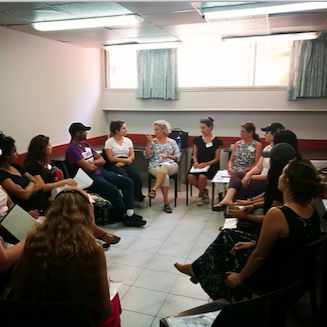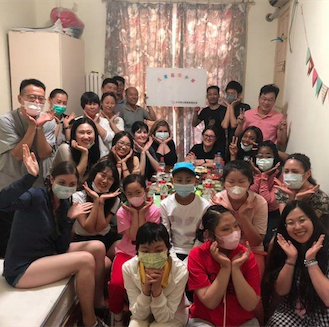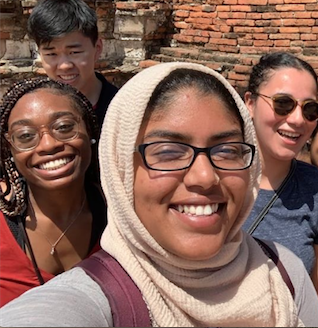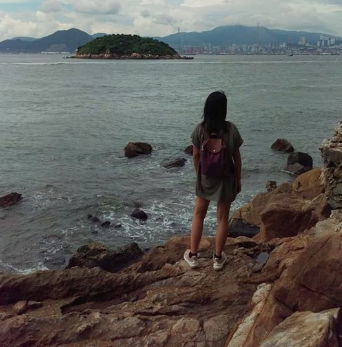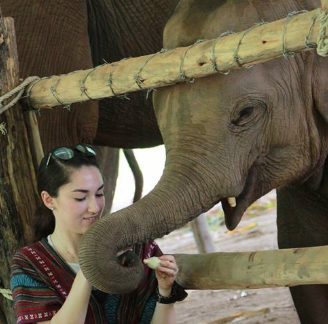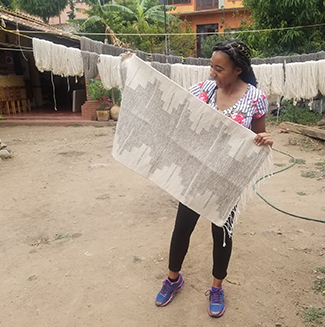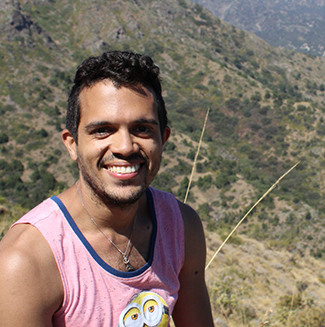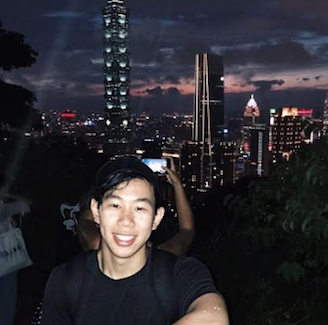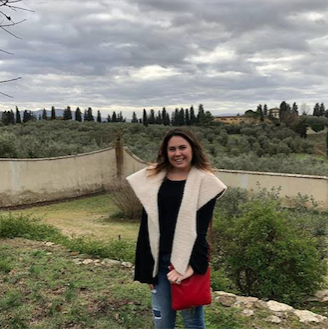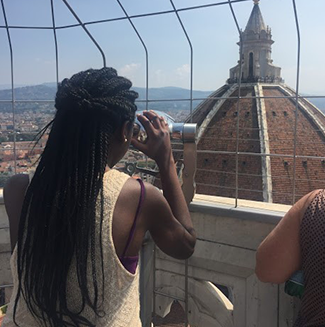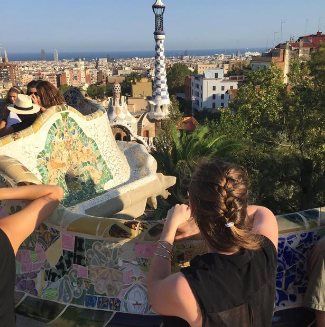- Rutgers
- Study Abroad
- first column
- Student Stories
- Stories About Language Learning
+ Stories About Language Learning +
"Going into Hong Kong, one of my top goals was improving my Cantonese, a project I had taken on a year prior. Cantonese is a primary language in Hong Kong, so it was expected I would be able to make advances in the language just by living there. But to me, that was all in theory. Up until Hong Kong, my primary method of documenting what I’d learned were vocabulary lists, and this was becoming dry and meaningless to me. Would I end up doing the same in Hong Kong, simply with more vocabulary than usual? While in New Jersey, I had met people online -- language exchange partners -- with whom I’d practice Cantonese in exchange for helping them with English. In talking to them over the phone, they exposed me to a large range of interesting, yet easily forgettable, vocabulary. For instance, I jotted down the words for “single eyelid” and “double eyelid”-- 單眼皮 and 雙眼皮-- while listening to an exchange partner talk about human appearances. I committed these to memory, but I was starting to feel like learning terms like these in isolation was a fairly meaningless exercise. I could learn how the characters looked and how to pronounce them, but without making connections to other words or real life instances, it felt like the learning was arbitrary -- just a bunch of lines and sounds corresponding to approximate English equivalents."
"I had the opportunity to travel to Israel, The Holy Land, with the RU Global study abroad scholarship. Although I have traveled before, this was my first time travelling to a country where I did not speak the language. I underestimated the difficulty of being able to communicate in the Hebrew language. The tools that I was accustomed to for translation purposes felt obsolete for the simple reason that the Hebrew language has its own unique alphabet. Furthermore, the ten-hour time difference made it difficult for me to communicate with my family on the West coast. I found this particularly challenging at first since I am accustomed to calling my family frequently since we live on opposite coasts. I had to adapt to my new environment and circumstances and develop a time schedule to communicate with my family and use other forms of communication such as WhatsApp."
"The biggest challenge for me while I studied abroad was trying to build a bridge with our communication. Being able to communicate, not only with words, but with body language, and other forms was a difficult task. I was trying to be culturally aware of the dos and don’ts but still send a message over without losing its purpose. Yes, of course there were translators, but to really learn something you must be able to try it on your own. So, for me, learning how to communicate properly was a challenge. Yes, they knew what I was trying to say slightly, but my challenge was getting them to be on the same level of understanding as me. And for me, vice versa, I needed to be on the same [level] as them when they tried to speak in English, which wasn’t some people’s strongest language."
"I can thank my study abroad trip for opening my eyes and simply helping me find what I truly want to do. The reason behind [me] wanting to study abroad was that I was bored of sitting in a lecture hall. I wanted hands-on stuff! The only problem I had about being in another country was not knowing the language. I always thought I was “set for life” because I was bilingual; yet, knowing English and Spanish does not help when you’re in Asia! I was getting the hang of the Thai language little by little and I know if I had the chance to stay longer, I would, without even thinking about it. I am so satisfied with the whole course that I honestly cannot think of one bad thing about my trip. Perhaps communicating with my family and friends back home was a little harsh considering it was an 11-hour time difference; however, we were getting the hang of it. It was much harder to adjust to the time once I got back home than when I arrived in Thailand."
"This brings me back to the conversation with my grandmother a few days ago. I have not always understood my grandma, [because of] the generation and culture gap [which created] a sizable divide between us. But, my time in Hong Kong has proved to be beneficial for my Cantonese, and ideas I want to communicate [in Cantonese] flow more easily [now]. Furthermore, I have lived for two short months in the city where she too had [lived] before immigrating to the United States. Studying abroad is filled with challenges, both expected and unexpected. However, these challenges reap rewards, both expected and unexpected."
"Coming to Thailand has been one of the most rewarding and eye-opening experiences for me. From working with patients in the clinics, teaching English to elementary students, playing with elephants, hiking the tallest mountain, and even cliff jumping, these incredible moments are ones that I will treasure for a lifetime. Although one of the biggest challenges being the obvious language barrier, with that came one of my favorite memories of this trip. When teaching English, I had the privilege of working with a third grade class. While we could not fully communicate with each other due to the language barrier, they still showed a willingness to not only learn what I was teaching but in trying to make me feel welcome and loved."
"The biggest culture shock was the language barrier. At some moments I became overwhelmed and discouraged. I would become frustrated when I could not reply, especially when I did not have my Spanish notebook. I felt bad I was unable to speak. However, I turned this into a lesson. I would tell myself and was reassured by others that not understanding is okay. A new language cannot be learned within a month. What really mattered was I had the courage to come and I was trying. This is what studying abroad is all about. It is about taking you out of your bubble, your comfort zone and trying something new. It is meant to expand your worldview, and that is exactly what traveling to Oaxaca has done for me."
“As a transfer student from Rutgers Newark it was my dream to travel abroad for my last semester. I wanted to finish my Spanish degree in Latin America given that my concentration was Latin American literature. As a child I emigrated from Cuba to the United States and experienced first hand a new culture, language and country. As a college student I was ready to experience this all over again with my study abroad semester. Chile was the best choice for me, and after much research I decided that Valparaíso would be the perfect fit for the experience that I was looking to get out of my time abroad.”
"My Chinese has improved immensely throughout the 5 months. Though I spoke some Chinese at home, and I took one semester of Chinese at Rutgers, it wasn’t until I arrived in Taiwan and had to speak Chinese for most of my daily life, that I felt the fastest improvement. I was able to improve my pronunciation, vocabulary, reading and writing abilities. By revisiting Taiwan as my older self and staying for 5 months, I was able to learn a lot about Taiwanese culture, lifestyle, and its geography. During my time here, I did quite a bit of traveling, visiting the East Coast, as well as a few major cities in the Southern part of Taiwan. Traveling not only has opened my eyes to the beauty of Taiwan, but it also has let me see more of what the world has to offer. It has also helped me to understand my parent’s living conditions and what the environment was like for them growing up."
"So, this one time abroad… Since the time I returned home from Florence, Italy, this is probably my most commonly used phrase. I find that not only was studying abroad one of the best things I have ever done, but it was also one of the most life changing things I’ve ever done. Some of my favorite moments abroad happened in the classroom. One of the best things that I did while abroad would have to be teaching English to Italian school kids. I was given the opportunity by my host university to volunteer at a high school in Florence and an elementary school in Prato to teach English twice a week to the students. This experience gave me the opportunity to become engaged with locals by taking the train early in the morning at the same time they were heading into school and work. This was a cool up-close way for me to see how the locals live their lives and for me to start picking up on some of their daily habits like stopping at a café on my way in to school and standing at the counter to eat a cornetto and drink a cappuccino."
"This summer, I was given a wonderful opportunity to travel to Italy for an Art History study abroad program. I got the chance to visit places I had only heard of in books, movies, school and by word of mouth. Being in Italy was truly a dream. Though I thoroughly enjoyed myself, I did face some challenges. For instance, my biggest challenge while abroad was learning the language. Before landing in Rome, I stopped in Istanbul, Turkey where I was surprised by the amount of people who spoke English. I had heard before that English is the language of business. By traveling abroad, I began to see that statement in action. When I arrived in Italy it was the same scenario. Once people heard my American accent they switched to English to make it easier for me. This indeed made my life easier, but as the same time I wished to learn the Italian language. I had to purposely challenge myself to make sure I was taking in the language being that it is a big component of culture."
"I personally went to Spain to improve my Spanish language skills. I consider myself semi-proficient in Spanish, but I would like to achieve a fluent or near fluent proficiency level by the time I graduate from Rutgers. For me personally, studying abroad is a large part of the process. On top of learning the formal grammatical rules and norms, I have to use colloquial language daily, and the full on, multi-dimensional immersion has been a great way to practice my Spanish in multiple contexts. My Spanish will never be perfect, but I’m really glad that I took this opportunity to better my language skills."


